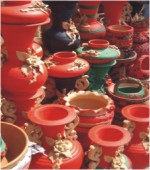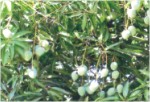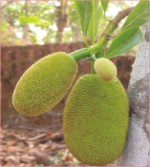|
Spotlight
We Nurture Our Culture through Baishakh
Mohammad Shafiqul Islam
 Baishakh is the first month in the Bengali Calendar used in Bangladesh and parts of India. The month of Boishakh also marks the official start of summer. The month is notorious for storms called Kalboishakhis. These storms usually start with strong gusts from the northwestern direction at the end of a hot day, and cause widespread destruction. Baishakh is the month when many of the seasonal fruits, especially mango and jackfruit, become available. Baishakh is the first month in the Bengali Calendar used in Bangladesh and parts of India. The month of Boishakh also marks the official start of summer. The month is notorious for storms called Kalboishakhis. These storms usually start with strong gusts from the northwestern direction at the end of a hot day, and cause widespread destruction. Baishakh is the month when many of the seasonal fruits, especially mango and jackfruit, become available.
The first day of Baishakh is celebrated as Pohela Baishakh or Bengali New Year's day. Pohela Baishakh is also known as Noboborsho. This is a very festive time for Bengalis.
The day is observed with cultural programs, festivals and carnivals all around the country. The day of Pohela Baishakh is also the beginning of all business activities in Bangladesh. The traders purchase new accounting books called Halkhata. Accounting in the Halkhata begins after this day. The shops also offer sweets and other gifts to customers.
Usually on Pohela Baishakh, the home is thoroughly scrubbed and cleaned; people bathe early in the morning and dress in fine clothes. They spend much of the day visiting relatives, friends, and neighbors. Special dishes are prepared to entertain guests. This is a rural festival that has become enormously big in the cities, especially in Dhaka.
 Baishakhi fairs are arranged in many parts of the country. Various agricultural products, traditional handicrafts, toys, cosmetics and various kinds of foods and sweets are sold in these fairs. Baishakhi fairs are arranged in many parts of the country. Various agricultural products, traditional handicrafts, toys, cosmetics and various kinds of foods and sweets are sold in these fairs.
The fairs also provide entertainment, with singers and dancers staging Jatra, Pala Gan, Kobigan, Jarigan, Gambhira Gan, and Gazir Gan. They present folk songs as well as Baul, Marfati, Murshidi and Bhatiali songs. Narrative plays like Laily-Majnu, Yusuf-Zulekha and Radha-Krishna are staged. Among other attractions are puppet shows and merry-go-rounds.
Many old festivals connected with New Year's Day have disappeared, while new festivals have been added. Kite flying in Dhaka and bull racing in Munshiganj used to be very colorful events. Other popular village sports were horserace, bullfights, cockfights, flying pigeons and boat racing. Some festivals, however, continue to be observed; for example, Bali (wrestling) in Chittagong and Gambhira in Rajshahi are still popular.
Observance of Pohela Baishakh has become popular in the cities. Early in the morning, people gather under a big tree or on the bank of a lake to witness the sunrise. Artists present songs to usher in the New Year. People from all walks of life wear traditional Bengali dresses: young women wear white saris with red borders, and adorn themselves with bangles, flowers and so on. Men wear white trousers or Lungi/Dhuti and Kurta (long shirt). Many townspeople start the day with the traditional breakfast of Panta Bhat (rice soaked in water), green chilies, onion, and fried hilsha fish.
 The most colorful New Year's Day festival takes place in Dhaka. Large numbers of people gather early in the morning under the banyan tree at Ramna Park where Chhayanat artists open the day with Rabindranath Tagore's famous song, Esho, he Baishakh, Esho Esho (Come, O Baishakh, Come, and Come). Several organizations celebrate the day with cultural programs. Newspapers bring out special supplements. There are also special programs on radio and television. The most colorful New Year's Day festival takes place in Dhaka. Large numbers of people gather early in the morning under the banyan tree at Ramna Park where Chhayanat artists open the day with Rabindranath Tagore's famous song, Esho, he Baishakh, Esho Esho (Come, O Baishakh, Come, and Come). Several organizations celebrate the day with cultural programs. Newspapers bring out special supplements. There are also special programs on radio and television.
The historical importance of Pohela Baishakh in the Bangladesh context may be dated back to 1965. In an attempt to suppress Bengali culture, the Pakistan Government had banned poems written by Rabindranath Tagore, the most famous poet and writer in Bengali literature. Protesting this move, Chhayanat opened their Pohela Baishakh celebrations at Ramna Park with Tagore's songs. The day continued to be celebrated in East Pakistan as a symbol of Bengali culture. After 1972 it became a national festival, a symbol of the nationalist movement and an integral part of the people's heritage. Later, in mid 1980s the Institute of Fine Arts added color to the day by initiating the Baishakhi parade.
It connects all ethnic Bengalis together despite religious and regional differences. In Bangladesh, Pohela Baishakh is a public holiday. The people of Bangladesh take the day very sincerely, as it is connected with their core. The day is a great source of inspiration for the young generation. They wish to hold on to their roots in diverse ways and Pohela Baishakh makes it possible for them.
We as Bengalis feel proud of our culture and heritage. We should hold on to the traditions tightly to uphold our image in the international arena. A nation with so many traditional galas can top the list as a rich ethnic divide in the global scale. We are Bengalis, our roots are tied with golden Bangladesh, and we shall stand valorously before the world as a proud nation with our own culture and creed, traditions and beliefs, glories and grandeurs.
Lecturer, Department of English
Metropolitan University, Sylhet
E-mail: msijewel@gmail.com
Copyright
(R) thedailystar.net 2007
|
